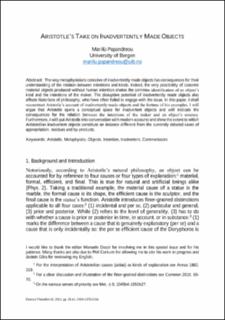Aristotle’s Take on Inadvertently Made Objects
Journal article
Published version

Åpne
Permanent lenke
https://hdl.handle.net/11250/3016209Utgivelsesdato
2021Metadata
Vis full innførselSamlinger
- Department of Philosophy [235]
- Registrations from Cristin [9489]
Originalversjon
Esercizi Filosofici. 2021, 16, 26-41.Sammendrag
The way metaphysicians conceive of inadvertently made objects has consequences for their understanding of the relation between intentions and kinds. Indeed, the very possibility of concrete material objects produced without human intention shakes the common identification of an object’s kind and the intentions of the maker. The disruptive potential of inadvertently made objects also affects historians of philosophy, who have often failed to engage with the issue. In this paper, I shall reconstruct Aristotle’s account of inadvertently made objects and the fortune of his examples. I will argue that Aristotle opens a conceptual space for inadvertent objects and will indicate the consequences for the relation between the intentions of the maker and an object’s essence. Furthermore, I will put Aristotle into conversation with modern accounts and show the extent to which Aristotelian inadvertent objects constitute an instance different from the currently debated cases of appropriation, residues and by-products.
